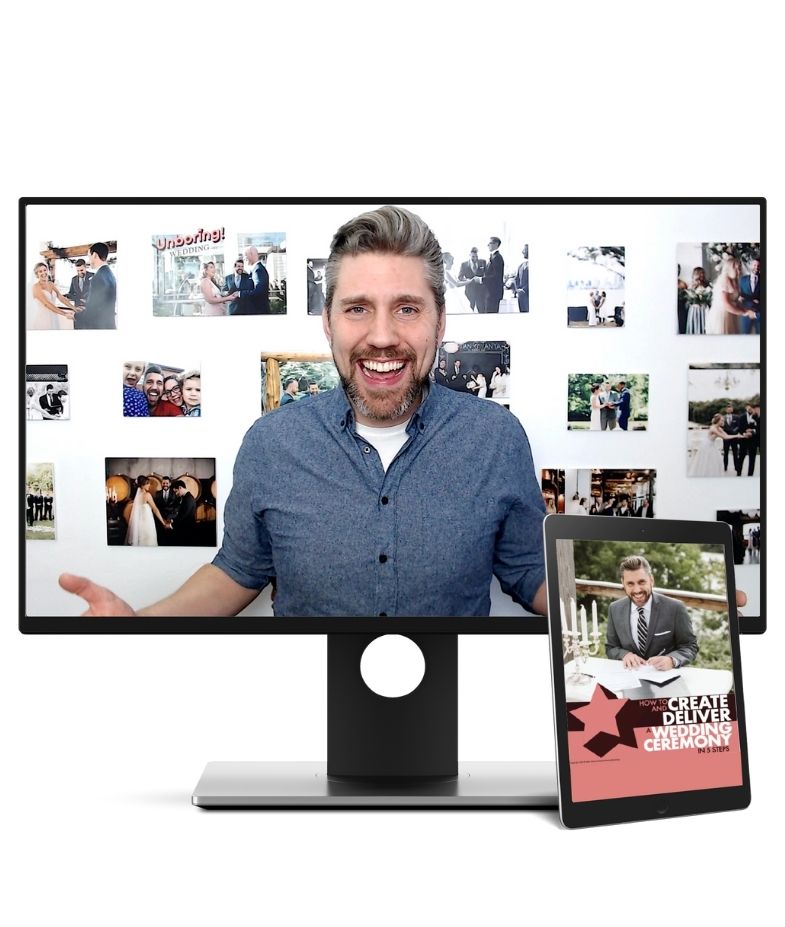You take your place at the front, turn to face the wedding guests, and… they’re all wearing masks. They’re spaced 6 feet apart. The room is half empty. You can’t make out any smiles. You can’t pick up on the excitement in the room.
The only sign of life you can see is pairs of open, expressionless eyes.
You clear your throat and get ready to speak. There are two ways this can go.
Say Nothing So It Seems Normal?
Conventional wisdom goes like this: “When something is socially uncomfortable, don’t say anything. Fewer people will notice if you don’t draw attention to it. Then we can move forward as if nothing happened.”
We learn this growing up in our families where it’s taboo to discuss the elephant in the room. Aunt Marg is ranting against the government again during Thanksgiving Dinner. Everyone drops their eyes and just waits for it to end. Or there are polite attempts to change the subject without drawing Aunt Marg’s ire.
We learn to act like this on the subway, too. Someone shuffles onto the train, shouting at no one in particular and hawking pamphlets about the end of the world. All the other passengers avert their eyes and pray (ironically) for the next stop to come quickly.
We learn this in classrooms. A student drops his pencil case and sixty-seven HB #2’s cascade down the stairs in the silence. The professor frowns wordlessly, then moves on while everyone else stifles their laughter.
We’ve been socially conditioned for years and in every setting: don’t say anything. Don’t draw attention to what everyone is gawking at. We will just get past this when it ends and move on.
So it feels natural: as the wedding officiant, you want to pretend this isn’t happening. The masks. The distancing. The empty room. Don’t draw attention to it, right? Make your opening remarks and get on with the ceremony as though everything is totally normal, right?
After all, won’t saying something about it make it even weirder?
Actually, no. It’s just the opposite.
Address the Discomfort Head-On
In my online course, I teach that wedding officiants want to have a moment with the guests before the ceremony starts. You start the ceremony by going to the front and playfully warming them up and getting them on your side with your opening remarks. Then you cue for the processional.
Here’s a crucial lesson I’ve learned after officiating hundreds of weddings: if the guests are uncomfortable about something, talk about it. Pointing out the discomfort instantly makes it better.
That means if it’s a scorching hot day, you say with a smile, “Is it warm enough for everyone out there?” “We sure are!” they’ll reply. Or if it’s frigid out and everyone’s teeth are chattering, you jokingly say, “Does anyone here wish that Jen and Sarah decided to get married in July?” “Sure do!” they’ll shout back. It always goes over huge, with everyone answering and laughing back.
Whenever you, the wedding officiant, address the discomfort wedding guests are feeling, something magical happens: you relieve the discomfort. Suddenly, everyone is in this together. When you name the thing, it’s no longer “out there.” It’s something we’re taking on as a team for this couple we love.
“Here we are baking in the summer sun on the 18th fairway with not a shred of shade in sight. It’s a beautiful day for a wedding. Are you ready for Jen and Sarah to get hitched?”
“Yeah!”
“Here we are freezing in the middle of a vineyard in October. It’s a beautiful day for a wedding. Are you ready for Ken and Sam to get hitched?”
“Yeah!”
There’s a sense of camaraderie.
Talking about the threat disarms the threat. Now it’s an adventure we’re experiencing. The demeanour of the guests changes from tense to tough. From pained to playful. I’ve seen it a hundred times.
Everyone’s too hot? Say so. Too cold? Say so. ‘Terrifying storm clouds moving in? Say so.
If this is true about weather conditions, it’s true about COVID. Address the discomfort of safety measures head-on.
COVID measures got us down? Say so.
Use Your Authority to Relieve the Discomfort
When you’re a wedding officiant, you’re not your pre-adolescent self at the family dinner table. And you’re not another hapless passenger on the subway.
You’re in a position of authority.
In fact, you’re the authority at the ceremony. Even if you don’t quite feel that way, you are. You’re in charge of this thing, and everyone is looking at you. Don’t downplay how much control you have and how you can affect how guests are feeling.
It’s important that wedding officiants not go to the social default position of “don’t talk about it.” We don’t want to behave the way we’ve been socially conditioned and “not draw attention to it.”
In a public setting when one person has the floor, it’s not helpful to avoid what’s making everyone uncomfortable. In fact, that makes it worse by scandalizing it. “Can you believe that just happened during a wedding?” It becomes all anyone can think about.
Addressing the discomfort head-on disarms it and makes it better.
Our authority at the wedding uniquely positions us to defuse and deflate any tension and discomfort. The wedding officiant has the power – with just a few words – to make guests feel relief and even joy.
Are the guests all spaced out from one another? Are they wearing masks? Can they not shake hands or hug? Talk about it right off the top. Name it. Use your voice and your power to transform it from “something-that’s-making-this-wedding weird” into “this-is-fine-and-we’re-in-it-together.”
Unlike feeling chilly from the weather, though, COVID requires everyone to behave a certain way. That’s where our voice of authority can help out the guests and the venue staff. Spelling out what we’d like guests to do gives them permission to not shake hands or to keep their distance.
For example, it can be very uncomfortable for someone to turn down a handshake. By referencing that specific social scenario, the wedding officiant gives guests an out if they’re offered a hand. “Remember what the officiant said?” they can later say with a smile and a polite “no.”
Do guests need to keep distance or sanitize often or keep masks on? Asking them to do that normalizes it for the evening.
Given the choice between saying nothing and saying “COVID makes us have to act weird,” there’s really only one option. Name the discomfort and use your authority to bring relief.
COVID Wedding Scripting
Below is a script of exactly what I’ve been saying at my COVID weddings. Adapt it and paste this into your opening remarks off the top. And remember – if you need some personal coaching and my full professional wedding script, I can do that, too!
Officiant: “A quick word on COVID-19 and the way it impacts how we’re gathered today. This is a wedding, and many of us are meeting each other for the first time today at this event. Or we haven’t seen each other for a long time. But we would like to remind everyone: for the sake of each of us and all our loved ones, we are doing everything we can to abide by the recommendations of public health.
So what that means for today is: yes, the bride and groom are gonna be all over each other. But for the rest of us, we ask that you feel okay about keeping the safe distance of 6 feet apart from one other. Wear a mask. Sanitize. Instead of a handshake or a hug when you meet someone, consider prayer hands or a hand to your chest.
In fact, a few of you very kindly offered your hand when we first met today. I had to say, “Please let me protect you by not shaking your hand.” No one got angry with me. Everyone was very understanding. So I’m gonna recommend that as a line that works, and you might want to try it.
This might all feel very strange today, but it’s not. We’re not being rude. We’re being respectful. For now. Hopefully, a few months from now, behaving this way will be considered very rude once again. But for now, it’s the right thing to do. ‘Sound good? Wonderful. And of course, please make use of the many hand sanitizer stations positioned throughout the space today.
With that, are you ready to get these two hitched? Perfect. Let’s begin.”

